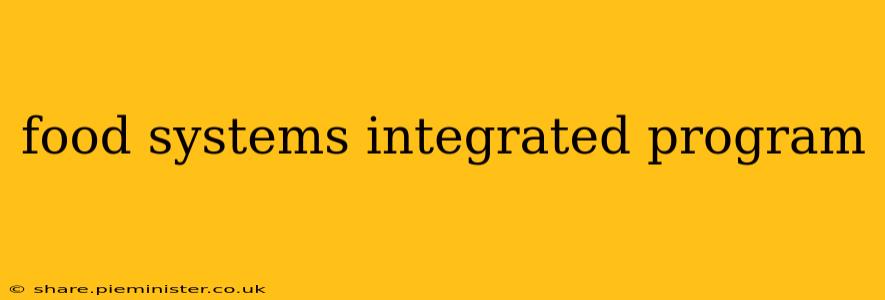Understanding Integrated Food Systems Programs: A Comprehensive Guide
Food systems are complex networks encompassing everything from farm to fork, influencing environmental sustainability, economic stability, and public health. Integrated food systems programs aim to holistically address the challenges and opportunities within these networks, fostering a more resilient, equitable, and sustainable approach to food production and consumption. This guide delves into the intricacies of these programs, exploring their key components, benefits, and challenges.
What is an Integrated Food Systems Program?
An integrated food systems program takes a comprehensive approach to food production and distribution, acknowledging the interconnectedness of various elements. Instead of focusing on isolated aspects, these programs consider the entire food chain, integrating ecological, economic, and social considerations. This holistic view allows for synergistic interventions that create more impactful and lasting change than piecemeal approaches. They often involve collaborations across sectors, including farmers, processors, retailers, consumers, researchers, and policymakers.
What are the key components of an integrated food systems program?
Several core components typically characterize integrated food systems programs:
- Sustainable Agriculture: Emphasis on environmentally friendly practices such as reducing pesticide use, promoting biodiversity, conserving water, and minimizing soil erosion. This often includes supporting diverse farming systems like agroecology and regenerative agriculture.
- Food Processing and Value Addition: Strategies to improve efficiency, add value to agricultural products, reduce waste, and create economic opportunities within local communities.
- Food Distribution and Retail: Developing efficient and equitable systems for transporting and distributing food, supporting local markets and reducing food miles. This may involve initiatives like farmers' markets, community-supported agriculture (CSA) programs, and improved infrastructure.
- Food Consumption and Waste Reduction: Promoting healthy diets, educating consumers about food choices, and reducing food waste throughout the supply chain.
- Policy and Governance: Creating supportive policies and regulatory frameworks that incentivize sustainable practices, promote food security, and address market failures. This includes things like subsidies for sustainable agriculture, food safety regulations, and initiatives to support local food systems.
- Research and Innovation: Investing in research to improve technologies, practices, and policies related to food systems. This includes exploring new ways to increase efficiency, reduce environmental impact, and enhance the nutritional value of food.
What are the benefits of integrated food systems programs?
Integrated approaches offer significant advantages:
- Enhanced Food Security: Increased local food production, improved supply chain resilience, and reduced dependence on global markets contribute to food security.
- Improved Nutrition and Public Health: Access to diverse and nutritious food reduces malnutrition and associated health problems.
- Environmental Sustainability: Reduced environmental impact through sustainable agricultural practices, reduced food waste, and lower transportation emissions.
- Economic Development: Creation of jobs, increased income for farmers and producers, and economic revitalization of rural communities.
- Social Equity: Fairer distribution of food and resources, empowering marginalized communities, and fostering community engagement.
What are the challenges of implementing integrated food systems programs?
Despite their potential, implementing integrated food systems programs faces various hurdles:
- Complexity and Coordination: Managing the intricate interactions across different sectors and stakeholders requires significant coordination and collaboration.
- Funding and Resources: Significant financial investment is needed to support sustainable agricultural practices, infrastructure development, and research.
- Policy Barriers: Inconsistent or inadequate policies can hinder the adoption of sustainable practices and the development of resilient food systems.
- Market Dynamics: Competing with large-scale industrial food systems can be challenging for smaller, sustainable producers.
- Consumer Behavior: Changing consumer habits and preferences to support local and sustainable food systems requires education and awareness campaigns.
How do integrated food systems programs address food security?
Integrated food systems programs address food security by building more resilient and equitable food networks. By increasing local food production, improving access to nutritious food, and strengthening supply chains, these programs ensure a more reliable and sustainable food supply, particularly in vulnerable communities. This resilience is crucial in mitigating the impacts of climate change, economic shocks, and other disruptions.
What role do integrated food systems programs play in promoting sustainable agriculture?
Integrated food systems programs are critical to promoting sustainable agriculture. They encourage the adoption of environmentally friendly practices that reduce the environmental footprint of food production. By integrating considerations of soil health, water conservation, biodiversity, and waste reduction, these programs contribute to a more ecologically responsible food system, protecting natural resources for future generations.
How can integrated food systems programs improve public health outcomes?
By improving access to nutritious food and reducing food insecurity, these programs directly contribute to better public health outcomes. A diet rich in fruits, vegetables, and other healthy foods reduces the risk of chronic diseases, while reducing food waste minimizes the environmental and economic burdens associated with foodborne illnesses.
In conclusion, integrated food systems programs offer a crucial pathway towards a more sustainable, equitable, and resilient food future. While challenges exist, their potential benefits for food security, environmental sustainability, public health, and economic development make them a vital area of focus for governments, researchers, and communities worldwide.
